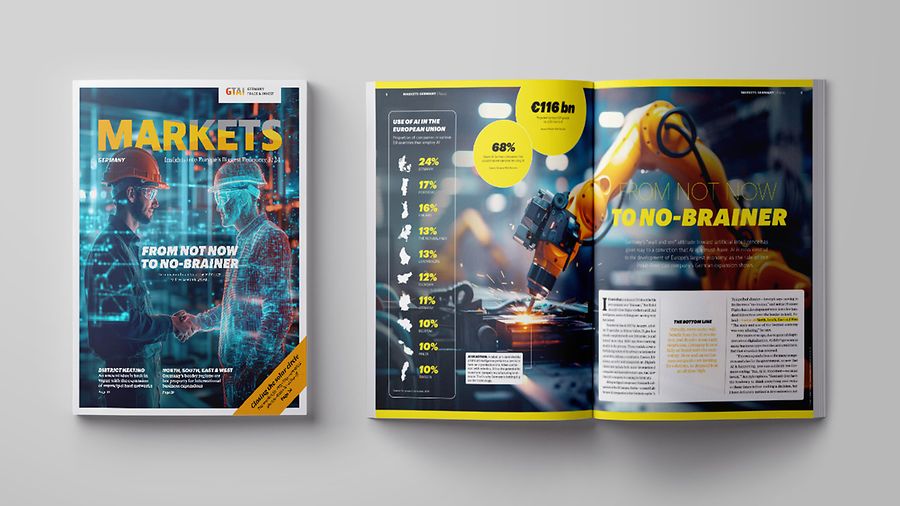Markets Germany Magazine 3/24 | Water Technologies
Preserving a Precious Resource
The increasing frequency of extreme weather is creating new challenges and at the same time new demands in the water economy in Germany and around the world. The sector is broad and open to new innovations, particularly digital ones.
Nov 13, 2024
The issue of water quality was on the agenda at last summer’s Olympic Games in Paris. Concerns about the cleanliness of the Seine River disrupted open water competitions, and although the main events did go ahead, some athletes later complained about feeling ill. It was a timely reminder that water management is an international priority in an era of rapid climate change.
One of the companies responsible for carrying out the tests required in Paris was Fluidion, a French firm that’s part of innovative alliance called Digital Water City extending across Europe. “In Digital Water City we’re working with 23 partners from ten European countries on water management solutions for tomorrow’s smart cities,” says the Berlin water authority BWB on its website. “Tests are running in the metropolises of Berlin, Paris, Sofia, Copenhagen and Milan. Measures are developed in close conjuncture with local governments, providers, research institutions and innovators in the areas of digitalization and the water economy.”

This article was published in issue 3-2024 of the Markets Germany Magazine. Read more articles of this issue here
Global warming and extreme weather have increased the need for better water management around the world. The new digitalized sector is still very much in the development stage, opening up new investment opportunities. Fluidion, which specializes in “smart instrumentation,” is a great example of a company that could have success in Germany. “While climate change is concerning, it also clearly opens up business opportunities for international companies—and not only for equipment suppliers,” says Julia Braune, Chairwoman/CEO of GTAI. Before joining the German government’s international business promotion agency, Braune became a leading authority on water supply issues in Germany and was the managing director of the German Water Partnership from 2017 to 2023. “Digitalization is also finding its way into the water industry. And that means much more than just the installation of radio water meters in households.”
Investment boost in Germany
In the face of climate change, public and private water suppliers across the country have been upgrading their plants and equipment to ensure they are fit for the future. Water investments amounted to over EUR 3.5 billion in 2022 according to Germany’s Federal Association of the Energy and Water Industries (BDEW)—an increase of 4.5 percent on the previous year.
Around 62 percent of the 2022 investments were spent on installing new pipes and repairing the existing network. New systems for water extraction and treatment are also in demand: German water suppliers invested more than EUR 500 million in this segment in 2022, mainly for the construction of new wells.
Increasingly, water management requires smart digital solutions. “In many areas, digitalization in the water industry is still in its infancy. This opens up great potential for providers of corresponding solutions,” says Marc Beckett, scientist at the Fraunhofer Institute for Interfacial Engineering and Biotechnology IGB in Stuttgart. IGB is involved in several research projects on drinking water. Companies like Fuseki based in Essen and Bremen have been developing digital solutions for the water industry for 25 years. With the data and analysis software “hetida 4 water” (h4w), they now have an AI-supported solution, which can support companies in the utilities industry particularly in infrastructure operation, asset management and data analysis. The software can make predictions, identify changes in status at an early stage and report faults.

Manufacturers of sensing technology and companies that can combine hardware, software and AI are now in demand. The start-up Preventio from Frankfurt/Main, for example, merges AI and Big Data to intelligently manage supply networks and detect leaks and anomalies more quickly. Its mission is to make managing complex infrastructure systems as easy as looking at a smartphone. The company, which emerged from a research project at Accadis University of Applied Sciences Bad Homburg, has continuously developed its portfolio of AI-based maintenance solutions and now offers solutions in the areas of leak detection and localization, predictive maintenance and risk assessment.
There are many opportunities in Germany for innovative digital solutions providers both from home and abroad. “Germany has an efficient water industry with a very well developed infrastructure and qualified specialists,” says Fraunhofer researcher Beckett. “This results in a large market that can hardly be served by local providers alone.”
“There are lots of opportunities for international companies, and the size of the market and the country’s excellence in technology, among other things, make it an attractive location for business expansions,” adds Braune. “Germany Trade & Invest can help companies find their place here.”
